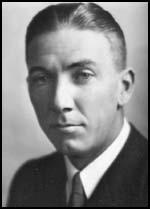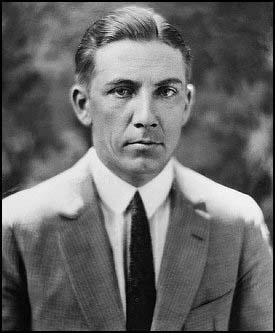Floyd B. Olson

Floyd Bjerstjerne Olson was born on 13th November, 1891. His parents were both emigrants, his father from Norway and his mother from Sweden. After he graduated from North High School in 1909 he worked on the Northern Pacific Railway before entering the University of Minnesota in 1910. He only stayed for one year and moved to Canada before settling in Seattle where he worked as a longshoreman and joined the Industrial Workers of the World (IWW).
In 1913 Olson returned to Minneapolis and found work in a law office as a clerk. At night he studied at the Northwestern Law College and graduated in 1915. Olson became a lawyer and in 1920 was appointed as Hennepin County Attorney. Olson joined the Progressive Party and was a strong supporter of Robert La Follette in his bid to become president. A strong opponent of racism, Olson prosecuted the local branch of the Ku Klux Klan.
In 1924 Olson moved to the Farmer-Labor Party and became its candidate for Governor of Minnesota. He told voters: "I am not a liberal, I am what I want to be - I am a radical... What is the ultimate we are seeking? The ultimate is a Cooperative Commonwealth." In the 1930 Olson won 82 of the state's 87 counties and beat the candidate of the Republican Party by 200,000 votes. In office he introduced public unemployment insurance, a mortgage moratorium on farms, progressive income tax, old age pensions and helped to establish cooperative business enterprises. Olson also advocated the state ownership of utilities and some basic industries and a government owned state bank.

Olson won the election for governor in 1932. When Franklin D. Roosevelt was elected as president, he appointed Henry Wallace as his Secretary of Agriculture. In 1933 Wallace drafted the Agricultural Adjustment Act (AAA). The AAA paid farmers not to grow crops and not to produce dairy produce such as milk and butter. The money to pay the farmers for cutting back production of about 30% was raised by a tax on companies that bought the farm products and processed them into food and clothing.
Olson supported the AAA but farmers in Minnesota faced another serious problem. During the First World War, farmers grew wheat on land normally used for grazing animals. This intensive farming destroyed the protective cover of vegetation and the hot dry summers began to turn the soil into dust. High winds in 1934 turned an area of some 50 million acres into a giant dust bowl.
Olson and Milo Reno, the head of Farmers' Holiday Association, insisted on compulsory production control and price-fixing, with a guaranteed cost of production. Henry Wallace argued this was against the idea as it would mean licensing every ploughed field in the country. Reno responded by calling a strike. According to William E. Leuchtenburg: "Strikers dumped kerosene in cream, broke churns, and dynamited dairies and cheese factories."
Olson upset conservatives by refusing to use state troops to crush the strikes in Minneapolis. He also threatened to challenge Franklin D. Roosevelt for the presidency unless he introduced a more radical New Deal. He argued that Roosevelt's National Industrial Recovery Act would not be successful "unless the key industries of the United States are taken over by the government."
In December 1935, Olson was diagnosed as suffering from stomach cancer. Floyd Olson continued to be active in politics until his death on 22nd August, 1936.
Primary Sources
(1) William E. Leuchtenburg, Franklin D. Roosevelt and the New Deal (1963)
The most forthright of the radical leaders was Minnesota's Governor Floyd Olson. When conservatives tied up relief bills in the legislature in April, 1933, Olson warned: "I shall declare martial law. A lot of people who are now fighting the measures because they happen to possess considerable wealth will be brought in by the provost guard. They will be obliged to give up more than they are giving up now." If capitalism could not prevent a recurrence of depressions, he cried, "I hope the present system of government goes right down to hell."
